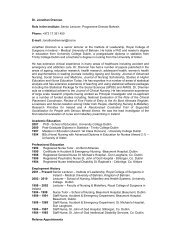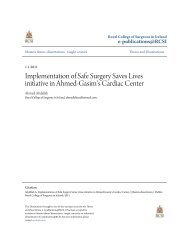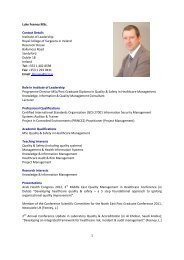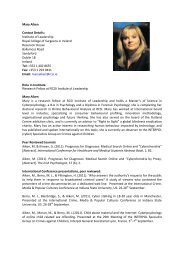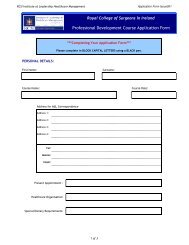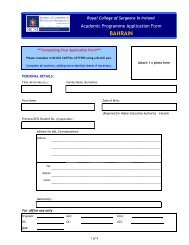Improving the Assessment and Triage of Patients with Mental Illness ...
Improving the Assessment and Triage of Patients with Mental Illness ...
Improving the Assessment and Triage of Patients with Mental Illness ...
Create successful ePaper yourself
Turn your PDF publications into a flip-book with our unique Google optimized e-Paper software.
Group One: Nursing documentation-<br />
Clinical Nurse Manager<br />
3 staff nurses<br />
(All above liaising <strong>with</strong> Nurse Practice Development)<br />
Group Two <strong>Mental</strong> <strong>Illness</strong> <strong>Triage</strong> Tool (Wall chart)<br />
Clinical Nurse Manager<br />
Clinical Facilitator<br />
2 staff nurses<br />
Group Three Computerised <strong>Triage</strong> Pop-up Screen<br />
Clinical Nurse Manager<br />
Clinical Facilitator<br />
2 staff nurses<br />
Determining <strong>the</strong> detail <strong>of</strong> <strong>the</strong> change<br />
Prior to <strong>the</strong> implementation <strong>of</strong> <strong>the</strong> <strong>Mental</strong> <strong>Illness</strong> <strong>Triage</strong> Tool wall chart <strong>and</strong> <strong>the</strong><br />
computerised pop up screen, benefits might be gained in carrying out a small scale<br />
observational audit <strong>of</strong> current practice. <strong>Patients</strong> are ordinarily triaged using <strong>the</strong> Manchester<br />
<strong>Triage</strong> System; this is a five level acuity scale basing patients symptoms against fifty<br />
different descriptors (McMahon, 2003) outlined in chapter 2. Decisions <strong>of</strong> emergency care<br />
need are dependent upon <strong>the</strong> level <strong>of</strong> experience <strong>and</strong> knowledge <strong>of</strong> <strong>the</strong> triage nurse. The<br />
Australian College for Emergency Medicine (ACEM) advocates that all patients should be<br />
triaged by a ‘specifically trained <strong>and</strong> experienced nurse’. However when it comes to <strong>the</strong><br />
triage <strong>of</strong> patients <strong>with</strong> mental illness even <strong>the</strong> more seasoned <strong>and</strong> accomplished staff nurses<br />
<strong>and</strong> clinical nurse managers can find <strong>the</strong> triage <strong>of</strong> this cohort <strong>of</strong> patient a challenging<br />
prospect. A member from each <strong>of</strong> group two <strong>and</strong> three sat in on <strong>the</strong> triage <strong>of</strong> patients<br />
presenting <strong>with</strong> mental illness <strong>with</strong> ano<strong>the</strong>r triage nurse. The patients were triaged using both<br />
<strong>the</strong> Manchester <strong>Triage</strong> System (Appendix E) <strong>and</strong> <strong>the</strong> <strong>Mental</strong> <strong>Illness</strong> <strong>Triage</strong> Tool (Appendix<br />
K). The nurses also recorded <strong>the</strong> length <strong>of</strong> time it took to triage <strong>the</strong> patients using <strong>the</strong><br />
25



